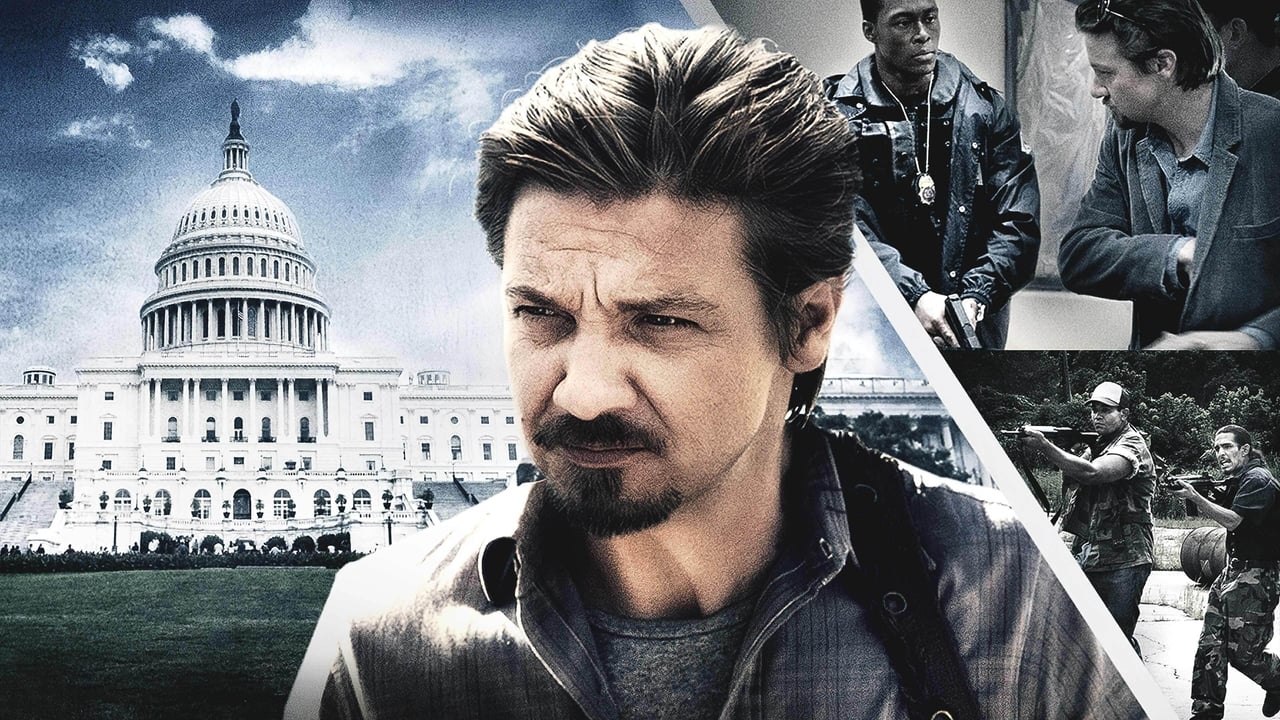Linbeymusol
Wonderful character development!
ReaderKenka
Let's be realistic.
Peereddi
I was totally surprised at how great this film.You could feel your paranoia rise as the film went on and as you gradually learned the details of the real situation.
Doomtomylo
a film so unique, intoxicating and bizarre that it not only demands another viewing, but is also forgivable as a satirical comedy where the jokes eventually take the back seat.
tomgillespie2002
Kill the Messenger, director Michael Cuesta's re-telling of journalist Gary Webb's expose of the CIA's illegal funding of Nicaraguan Contra rebels and its links to the crack epidemic sweeping across the country, has all the ingredients for a gripping, fact-based drama centred around a story everybody should know more about (at the time, people were distracted by Bill Clinton's White House antics involving Monica Lewinsky). Seminal movies such as All the President's Men and Zodiac portrayed the dangers that come with investigative journalism and managed keep a real-life story suspenseful despite many knowing the outcome already. Kill the Messenger sadly doesn't achieve much of this, and although the movie is competently made and solidly acted, it struggles to hold the attention it should demand by playing things frustratingly formal.Jeremy Renner stars as Webb, the goateed, informally-dressed San Jose Mercury News reporter who carries more than a whiff of anti- establishment about him. While investigating the government seizure of drug dealer's property, even when they've been found innocent, he is handed court papers which seem to reveal that a major drug runner is actually a CIA operative. It's a revelation that will change Webb's life, and he is soon on the government's radar when he follows leads to kingpin Rick Ross (Michael Kenneth Williams) and eventually to Managua to meet with cartel boss Norwin Meneses (Andy Garcia). Everything he uncovers seems to suggest that the CIA, committing high treason in the process, is indirectly funding the wave of crack decimating entire neighbourhoods throughout the U.S. Webb reports his findings in a three-part series entitled Dark Alliance, which quickly becomes one of the internet's first viral hits, before the CIA decide to turn his world upside down.In many ways, the story of a little guy being cruelly picked apart by higher powers is comparable to the one told in The Insider. Yet Michael Mann's masterpiece also demonstrated that a film can be grounded in fact and procedural while keeping the audience engrossed in the story it's telling. Kill the Messenger wisely reserves a large chunk of the running time for what Webb went through after breaking the story, but much of this is bogged down in clichéd domestic squabbles, with Rosemarie DeWitt finding herself criminally underwritten as the nagging wife whose feelings drastically change from one scene to the next. However, it has its moments, especially when showing how Webb was surgically discredited while his bosses (played by Mary Elizabeth Winstead and Oliver Platt) slowly distanced themselves from the negative attention. Renner manages to carry the film despite not being given a whole lot to do apart from exchanging a few "I'm right, you're wrong," arguments with his colleagues. The real-life story alone is shocking enough to make the film worth a watch, but there's a emptiness at its core.
Danny Blankenship
"Kill the Messenger" is a pretty well done film that's provocative and soul searching that uncovers hidden lies as the federal government has a dirty little game a drug for guns profit! Most remember the headlines and the scandal from the 1980's and 1990's when it was revealed that the CIA was arming rebels in Nicaragua to help fight other countries and foreign agencies all while turning the other way and letting them profit by importing and selling cocaine in the United States. Thru it all as each detail is uncovered with anger this political drama is carried by the performance of Jeremy Renner as Gary Webb a hard charging investigative reporter from California as he tries to prove that the CIA used cocaine profits to fund Contra rebels this tale explodes with suspense and personal drama really it's an eye opening political thriller.
eddie_baggins
One of those true life stories that is sadly more intriguing than it's big screen treatment, Kill the Messenger is a middle of the road drama/thriller that for any number of reasons can't break free from its shackles to become anything more than a mildly interesting cautionary tale, despite a decent turn by the in need of a hit Jeremy Renner and a subject matter that is ripe for political commentary.At one time or another positioned for a run in the awards season, Michael Cuesta's film found itself on the end of a low key world wide release that would've completely bypassed some people's memories. Watching the film now it's not hard to see why the film failed to make a splash. From the sombre tone, the uninspired yet workmanlike direction, a wasting of quality supports that range from Michael Sheen through to Michael Kenneth (Chalky White, Omar Little) Williams and a curiously lacking look into the nasty business the CIA was involved in in regard to the South American drug trade, Messenger just doesn't do enough with its real life potent material to come fully to life.I for one must be the first to admit to a lack of knowledge regarding what Messenger deals with and it's in this fact that the most amount of good will stems from, as there's a number of people that want to know more about the shady operations that America gets involved in. Renner's dogged journalist Gary Webb unearths wide ranging and politically juicy facts about drugs being sold to fund various programs and wars and the film comes alive when both Gary and the audience get thrown into situations involving those that were privy to the clandestine operations. It does feel like there was more to unearth in this real life investigation but what is bought forward is enough to drive this film and the viewer's interest without ever becoming truly invested as other films of the same ilk have done in the past.By no means a badly made film, this is a film that will frustrate due to its undeniable potential that remains unreached, Kill the Messenger portrays some incredibly interesting events in a sadly non-incredible way. With another solid if unspectacular lead turn by the worryingly out of sorts Jeremy Renner, Messenger never gets out of first gear and succeeds to the level it does thanks to its real life events it depicts.3 unlucky car windows out of 5
Robert J. Maxwell
Nice acting all around. Especially the central figure, Jeremy Renner, whom I like a lot. The reasons I find him admirable are not just that he's a reliable actor, which he is, but that he's no taller and no more handsome than I am. (Let us operationalize our value judgments.) I respect the location shooting too, and I lived in San Jose about the time these events were transpiring. Elections were underway. And I found the coverage of the San Jose Mercury-News to be at least the equal of those two colossi to the north, the Chronicle and the Examiner. I was doing research on the milieu to which recently discharged psychiatric patients were trying to adjust, and the Mercury-News was a fountain of data. The CIA are after reporter Gary Webb for spilling some beans that should not have been spilled. A pretty olla podrida of rotten beans too. The CIA had been selling cocaine in the black districts of Los Angeles in order to fund illegal arms shipments to a CIA-sponsored revolutionary group in Nicaragua, ruled by a government we didn't like. There was never much doubt about the CIA's illegal support of the Contras. The president said that the facts led him to believe it was true. The question had to do with the importation of crack cocaine and its sale by the CIA.It was controversial and important stuff. It received a great deal of criticism from papers like the Post and the L.A. Times. The Inspector General's report acknowledged that the CIA had indeed worked with suspected drug runners while supporting the contras. The public wasn't anxious to hear its judicial icons knee-capped, I guess, because there were plenty of pick up trucks around with bumper stickers calling for Ollie North to be president. Ollie North was the instrument that organized the illegal operation because, as his secretary put it, they had to answer to a higher authority than the United States Constitution. And why not "North For President?" When you get right down to it, what else is the constitution but an old piece of paper crawling with germs?But the strength of the story is knee-capped by dramatic misstatements. It is simply not well written. A man calls Webb in the middle of the night and warns him to be alert. The man on the other end, calling alone from an office, is whispering. Why is he whispering? Okay. There are shots of Webb coming and going at his home and at work. The shots are dominated by gigantic close ups of solemn faces. Why? Close ups, if necessary, are used for portentous moments unless you're making a commercial for a toothpaste. The ultimate effect is that of being hit over the head with a crowbar.Okay. Webb is sitting at home with his wife, his adolescent son lounging in the doorway, during a visit by Webb's sympathetic young editor and boss. The editor hesitantly tells Webb that the CIA had dug into his past and found evidence of an extra-marital liaison. The guy's family knows nothing of this and the friendly editor pops up with this news item that threatens its integrity.Okay. We're now in the garage where Webb is trying to explain the affair to his son. The kid, who is about sixteen, is so choked up, so close to tears, that he can barely speak. "I made a mistake!", explains Webb. "Did -- did you love her?" "Do you love Mom?" "I'm really disappointed in you." I don't believe a word of that conversation.The film is based on a book by Gary Webb. Everybody wants to be the hero of his own story. Nobody wants to be comic relief.The writers need to go back and watch "The Insider" again and pick up all the mistakes they should have avoided. Then they should watch "All the President's Men" again to see how it should be done. The director needs someone to tell him he's making a dramatic feature film, not a commercial for Mennen underarm deodorant or one of those Canadian specials that show us a universe filled with betrayal and heartbreak on Lifetime Movie Network.Yet there are implications that, however muted, take us beyond one hero's tragedy. The Washington Post and the Los Angeles Times both try to torpedo Webb's story, not only because they question his sources but evidently because they dislike seeing hot news in a smaller newspaper. They "attack the messenger" by digging into his private life as if this somehow taints his story -- which it does. The logical fallacy is called "ad hominem", meaning "to the man." It works very well, even now.

